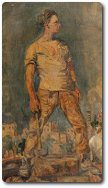Gerard Manley Hopkins, selected poems Contents
- As Kingfishers Catch Fire
- Binsey Poplars
- The Blessed Virgin Mary Compared to the Air We Breathe
- Carrion Comfort
- Duns Scotus' Oxford
- God's Grandeur
- Harry Ploughman
- Henry Purcell
- Hurrahing in Harvest
- Inversnaid
- I Wake and Feel the Fell of Dark
- Synopsis of I Wake and Feel the Fell of Dark
- Commentary on I Wake and Feel the Fell of Dark
- Language and tone in I Wake and Feel the Fell of Dark
- Structure and versification in I Wake and Feel the Fell of Dark
- Imagery and symbolism in I Wake and Feel the Fell of Dark
- Themes in I Wake and Feel the Fell of Dark
- The Leaden Echo and the Golden Echo
- Synopsis of The Leaden Echo and the Golden Echo
- Commentary on The Leaden Echo and the Golden Echo
- Language and tone in The Leaden Echo and the Golden Echo
- Structure and versification in The Leaden Echo and the Golden Echo
- Imagery and symbolism in The Leaden Echo and the Golden Echo
- Themes in The Leaden Echo and the Golden Echo
- The May Magnificat
- My Own Heart, Let Me Have More Pity On
- Synopsis of My Own Heart, Let Me Have More Pity On
- Commentary on My Own Heart, Let Me Have More Pity On
- Language and tone in My Own Heart, Let Me Have More Pity On
- Structure and versification in My Own Heart, Let Me Have More Pity On
- Imagery and symbolism in My Own Heart, Let Me Have More Pity On
- Themes in My Own Heart, Let Me Have More Pity On
- No Worst, There is None
- Patience, Hard Thing!
- Pied Beauty
- The Sea and the Skylark
- Spelt from Sibyl's Leaves
- Spring
- Spring and Fall
- St. Alphonsus Rodriguez
- The Starlight Night
- That Nature is a Heraclitean Fire and of the Comfort of the Resurrection
- Synopsis of That Nature is a Heraclitean Fire
- Commentary on That Nature is a Heraclitean Fire
- Language and tone in That Nature is a Heraclitean Fire
- Structure and versification in That Nature is a Heraclitean Fire
- Imagery and symbolism in That Nature is a Heraclitean Fire
- Themes in That Nature is a Heraclitean Fire
- Thou Art Indeed Just, Lord
- Tom's Garland
- To Seem the Stranger
- To What Serves Mortal Beauty
- The Windhover
- The Wreck of the Deutschland
- Beauty and its purpose
- The beauty, variety and uniqueness of nature
- Christ's beauty
- Conservation and renewal of nature
- God's sovereignty
- The grace of ordinary life
- Mary as a channel of grace
- Nature as God's book
- Night, the dark night of the soul
- Serving God
- Suffering and faith
- The temptation to despair
- The ugliness of modern life
- Understanding evil in a world God has made
Themes in Harry Ploughman
Grace in ordinary life
 This is the single theme. The sonnet is focused entirely on Harry's physique and the unity of movement he achieves in his work: this is his inscape. Like many men who have sedentary jobs or a delicate physique, Hopkins seems to admire the raw strength of this labourer immensely, building up an idealised picture of him.
This is the single theme. The sonnet is focused entirely on Harry's physique and the unity of movement he achieves in his work: this is his inscape. Like many men who have sedentary jobs or a delicate physique, Hopkins seems to admire the raw strength of this labourer immensely, building up an idealised picture of him.
As with Tom in Tom's Garland, ‘Harry' is a composite person. No single specific ploughman is being portrayed, which makes the inscape much vaguer.
More on inscape: The original idea of inscape was particular places or views. Here, Hopkins sees the man as much like an animal as anything. Ted Hughes, in some of his early poems, catches the same sort of feel of the idealised animal doing its special thing.
The idea of grace is captured in the compound ‘Churlsgrace'. It is a grace of motion, of creation, rather than any supernatural grace (given to undo the effects of the Fall). There is no sense of anything fallen in Harry. He is perfect, created as he should be.
Investigating Harry Ploughman
- Pick out words, phrases and images that mark the man's essential being, the essence of his ploughing.
- What words or phrases convey Hopkins' admiration for the man?
A term used by Gerard Manley Hopkins to denote the uniqueness of a person or piece of Nature, such as a landscape, a cloud formation or waves on the sea. It is the artist's trained perception to grasp this uniqueness of form and being.
Undeserved favour. The Bible uses this term to describe God's gifts to human beings.
In the Bible, 'creation' can mean both the process by which the universe was made by God and the created order which emerged.
The disobedience of Adam and Eve in the Bible is known as the Fall of Humankind. Christians believe that humans from then on have had a a predispostion to disobey God.
